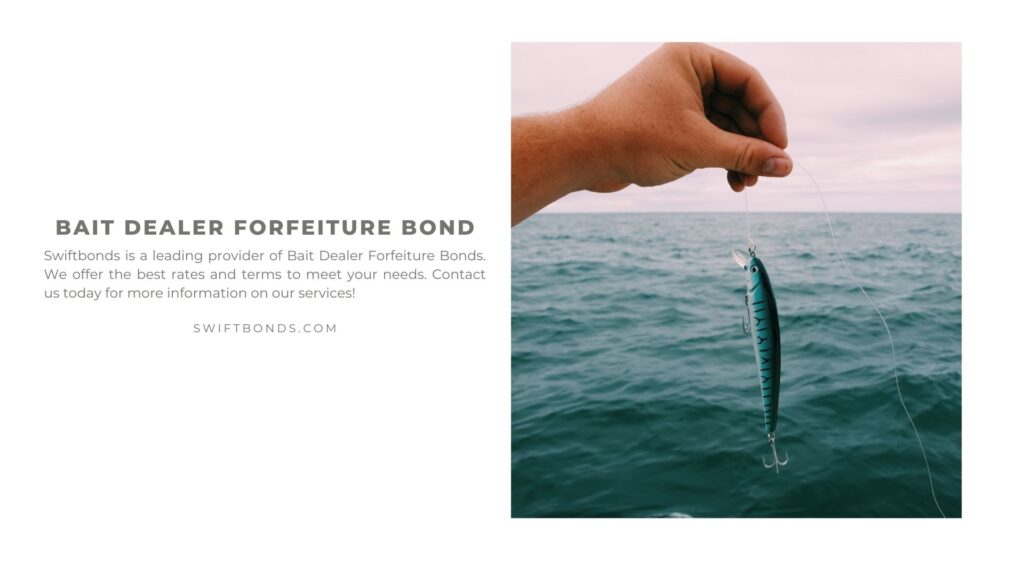
Get An Instant Quote on GA – Bait Dealer Forfeiture $2,000 Bond Now

Introduction
In Georgia, the fishing industry thrives on the availability of high-quality bait, essential for anglers to lure their prized catches. However, to regulate the trade and ensure fair practices, bait dealers are required to obtain a bond. The GA – Bait Dealer Forfeiture $2,000 Bond serves as a vital tool, guaranteeing compliance with regulations and safeguarding the interests of both dealers and consumers. Understanding the purpose and implications of this bond is crucial for sustaining integrity within Georgia's fishing community.

What is the GA – Bait Dealer Forfeiture Bond?
The GA – Bait Dealer Forfeiture $2,000 Bond is a regulatory requirement imposed on bait dealers operating in Georgia. This bond serves as a form of financial security, ensuring that dealers adhere to industry standards, licensing requirements, and consumer protection laws. By obtaining this bond, bait dealers demonstrate their commitment to ethical business practices and their willingness to comply with all applicable regulations governing the sale and distribution of bait products.
Ensuring Quality and Safety
Quality and safety are paramount in the fishing industry, where the effectiveness of bait directly impacts anglers' success and experiences. The GA – Bait Dealer Forfeiture $2,000 Bond provides assurance to consumers that bait dealers will uphold standards of quality and safety in the products they offer. By maintaining compliance with regulations and industry best practices, bonded bait dealers contribute to the preservation of Georgia's natural resources and the enjoyment of fishing activities for all.
Protecting Consumer Interests
Consumers rely on bait dealers to provide reliable products that meet their expectations and needs. The GA – Bait Dealer Forfeiture $2,000 Bond protects consumer interests by offering financial recourse in cases of fraud, misrepresentation, or non-compliance by bonded dealers. If consumers encounter issues such as bait quality discrepancies, quantity discrepancies, or deceptive practices, they can file claims against the bond to seek compensation for their losses or damages.
Supporting Regulatory Compliance
Regulatory compliance is essential for maintaining the integrity and sustainability of Georgia's fishing industry. The GA – Bait Dealer Forfeiture $2,000 Bond encourages bait dealers to operate within the bounds of the law, obtain necessary licenses, and adhere to relevant regulations. By fulfilling their bond obligations, dealers contribute to a transparent and accountable marketplace, fostering trust among regulators, consumers, and industry stakeholders.
Conclusion
The GA – Bait Dealer Forfeiture $2,000 Bond plays a crucial role in promoting fair trade, consumer protection, and regulatory compliance within Georgia's fishing industry. By understanding the purpose and requirements of this bond, bait dealers can operate responsibly, maintain high standards of quality and safety, and contribute to the sustainability of fishing practices in the state.
Frequently Asked Questions
Can the GA – Bait Dealer Forfeiture $2,000 Bond be used to cover liabilities arising from environmental damages caused by the improper disposal of unused or expired bait products by bonded dealers, particularly in cases where contaminants from bait materials affect water bodies or ecosystems, and how are such claims handled under the bond?
While the primary purpose of the bond is to ensure compliance with regulations governing bait sales and distribution, questions may arise about its coverage for environmental liabilities. If environmental damages occur due to the improper disposal of bait products by bonded dealers, affected parties may seek recourse through the bond to cover cleanup costs or restoration efforts. However, the bond's applicability to such claims may depend on factors such as the terms of the bond agreement, the extent of the damages, and applicable environmental laws or regulations.
Are there provisions for extending the coverage of the GA – Bait Dealer Forfeiture $2,000 Bond to include liabilities resulting from the introduction of invasive species or diseases through contaminated bait products sold by bonded dealers, particularly in cases where non-native species or pathogens disrupt local ecosystems or harm native wildlife, and how are such claims evaluated under the bond?
As bait products play a crucial role in the spread of invasive species or diseases, questions may arise about the bond's coverage for liabilities related to such occurrences. If invasive species or diseases are introduced through contaminated bait products sold by bonded dealers, affected parties may seek compensation through the bond for damages incurred. However, evaluating claims involving invasive species or diseases may require evidence such as scientific research, expert testimonies, or regulatory findings to establish a causal link between the contaminated bait products and the resulting damages.
How does the GA – Bait Dealer Forfeiture $2,000 Bond address liabilities resulting from disputes over the legality or sustainability of bait harvesting practices employed by bonded dealers, particularly in cases where consumers or environmental advocates allege that bait sources are depleted, endangered, or harvested using harmful methods, and how can such claims be substantiated under the bond?
Disputes over the legality or sustainability of bait harvesting practices can arise, raising questions about the bond's coverage for such issues. If consumers or environmental advocates allege that bait sources are depleted, endangered, or harvested using harmful methods by bonded dealers, they may file claims against the bond to seek remediation or compensation. Substantiating claims involving bait harvesting practices may require evidence such as harvesting permits, environmental impact assessments, or expert opinions to demonstrate non-compliance with regulations or industry standards.
